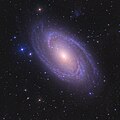Messier 81

Messier 81 (also known as NGC 3031 or Bode's Galaxy) is a spiral galaxy. It is in the constellation Ursa Major. It is large. It is about 12 million light-years from Earth. It has an active galactic nucleus (which has a supermassive black hole). For these reasons Messier 81 has been well studied by professional astronomers. The galaxy is large and very bright. This makes it a popular object for amateur astronomers to look at.[1]
Messier 81 was discovered by Johann Elert Bode in 1774.[2] The galaxy is sometimes called "Bode's Galaxy". In 1779, Pierre Méchain and Charles Messier reidentified Bode's object. They listed it as Messier 81 in the Messier Catalogue.[2]
M81 is dusty. Interstellar dust is found in the galaxy's spiral arms. It is connected with star formation areas.[3][4] The hot blue stars in star formation areas heat the dust and the hot dust emits infrared energy from these areas.
Supernova
Only one supernova has been seen in Messier 81.[5] The supernova is named SN 1993J. It was discovered on 28 March 1993 by F. Garcia in Spain.[6] At the time, it was the second brightest supernova seen in the 20th century.[7]
M81 Group
Messier 81 is the largest galaxy in the M81 Group. The M81 Group is a group of 34 galaxies in the constellation Ursa Major.[8] This Group and the Local Group, containing the Milky Way,[8] are close together in the Virgo Supercluster.
Amateur astronomy
Messier 81 is about 10° northwest of Alpha Ursae Majoris.[1][9] Messier 81 and Messier 82 can both be easily seen using binoculars and small telescopes.[1]
Messier 81 Media
An infrared image of Messier 81 taken by the Spitzer Space Telescope. The blue colors represent stellar emission observed at 3.6 μm. The green colors represent 8 μm emission originating primarily from polycyclic aromatic hydrocarbons in the interstellar medium.
M81 with satellite galaxy Holmberg IX in the top center-right corner
Related pages
References
- ↑ 1.0 1.1 1.2 O'Meara, S. J. (1998). The Messier Objects. Cambridge University Press. ISBN 0-521-55332-6.
- ↑ 2.0 2.1 Jones, K. G. (1991). Messier's Nebulae and Star Clusters (2nd ed.). Cambridge University Press. ISBN 0-521-37079-5.
- ↑ Gordon, K. D.; Pérez-González, P. G.; Misselt, K. A.; Murphy, E. J.; Bendo, G. J.; Walter, F.; Thornley, M. D.; Kennicutt Jr., R. C.; Rieke, G. H.; Engelbracht, C. W.; Smith, J.-D. T.; Alonso-Herrero, A.; Appleton, P. N.; Calzetti, D.; Dale, D. A.; Draine, B. T.; Frayer, D. T.; Helou, G.; Hinz, J. L.; Hines, D. C.; Kelly, D. M.; Morrison, J. E.; Muzerolle, J.; Regan, M. W.; Stansberry, J. A.; Stolovy, S. R.; Storrie-Lombardi, L. J.; Su, K. Y. L.; Young, E. T. (2004). "Spatially Resolved Ultraviolet, Hα, Infrared, and Radio Star Formation in M81". Astrophysical Journal Supplement Series. 154 (1): 215–221. arXiv:astro-ph/0406064. Bibcode:2004ApJS..154..215G. doi:10.1086/422714. S2CID 17283721.
- ↑ Pérez-González, P. G.; Kennicutt Jr., R. C.; Gordon, K. D.; Misselt, K. A.; Gil De Paz, A.; Engelbracht, C. W.; Rieke, G. H.; Bendo, G. J.; Bianchi, L.; Boissier, S.; Calzetti, D.; Dale, D. A.; Draine, B. T.; Jarrett, T. H.; Hollenbach, D.; Prescott, M. K. M. (2006). "Ultraviolet through Far-Infrared Spatially Resolved Analysis of the Recent Star Formation in M81 (NGC 3031)". Astrophysical Journal. 648 (2): 987–1006. arXiv:astro-ph/0605605. Bibcode:2006ApJ...648..987P. doi:10.1086/506196. S2CID 13901458.
- ↑ "NASA/IPAC Extragalactic Database". Results for extended name search on NGC 3031. Retrieved 2007-02-27.
- ↑ Ripero, J.; Garcia, F.; Rodriguez, D.; Pujol, P.; Filippenko, A. V.; Treffers, R. R.; Paik, Y.; Davis, M.; Schlegel, D.; Hartwick, F. D. A.; Balam, D. D.; Zurek, D.; Robb, R. M.; Garnavich, P.; Hong, B. A. (1993). "Supernova 1993J in NGC 3031". IAU Circular. 5731: 1. Bibcode:1993IAUC.5731....1R.
- ↑ Schmidt, B.P.; Kirshner, R.P.; Eastman, R.G.; Grashuis, R.; Dell'Antonio, I.; Caldwell, N.; Foltz, C.; Huchra, John P.; Milone, Alejandra A. E. (1993). "The unusual supernova SN1993J in the galaxy M81". Nature. 364 (6438): 600–602. Bibcode:1993Natur.364..600S. doi:10.1038/364600a0. S2CID 4304547.
- ↑ 8.0 8.1 Karachentsev, I. D. (2005). "The Local Group and Other Neighboring Galaxy Groups". Astronomical Journal. 129 (1): 178–188. arXiv:astro-ph/0410065. Bibcode:2005AJ....129..178K. doi:10.1086/426368. S2CID 119385141.
- ↑ Eicher, D. J. (1988). The Universe from Your Backyard. Cambridge University Press. ISBN 0-521-36299-7.
Other websites
| Wikimedia Commons has media related to Lua error in Module:Commons_link at line 62: attempt to index field 'wikibase' (a nil value).. |
- StarDate: M81 Fact Sheet Archived 2011-07-22 at the Wayback Machine
- M81, SEDS Messier pages
- SST: Messier 81 Archived 2006-06-19 at the Wayback Machine
- APOD: Bright Galaxy M81 (6/20/02)
- NightSkyInfo.com - M81, Bode's Galaxy Archived 2008-09-25 at the Wayback Machine
- Messier 81 on WikiSky: DSS2, SDSS, GALEX, IRAS, Hydrogen α, X-Ray, Astrophoto, Sky Map, Articles and images
- ESA/Hubble images of M81 Archived 2007-10-13 at the Wayback Machine
- Galaxy Messier 81 (Bode's Galaxy)
- Spitzer Image Gallery Archived 2007-08-31 at the Wayback Machine
- Helkit Observatory Archived 2008-11-20 at the Wayback Machine
- Deep image of the M81 Area



